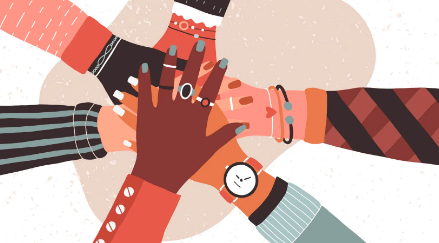
I’m the first to admit that while we pride ourselves as an organization in building more diverse and inclusive engineering teams and startup ecosystems, I’m relatively new to being a true anti-racist ally to Black and Brown communities in tech.
Only in the past year have I come to understand that ‘not being a racist’ was not at all the same thing as being an anti-racist. It seems strange to even say that out-loud now that I understand the critical difference, but I think it’s important to be forthright and open. I’m certainly still no expert but I’m a passionate ally and I thought my learnings in the past year may be helpful to others who want to see changes in startup ecosystems and beyond.
I continue to work to improve myself and lift others up that have been fighting against oppressive systems and pushing for equity far longer than I have.
Aaron Clark of Justice Reskill and Brenda Herrera Moreno from In.Visible Paradigms are a couple of the folks I’m working closely with every month for the past year to deepen my understanding of white supremacist systems and how to dismantle them.
I believe that one of the things I can best do as an ally, beyond my day job of building diverse and inclusive engineering teams for startups around the country, is to use my large platform to foster change by amplifying voices from BIPOC (Black, Indigenous, and People of Color) communities that understand the history, the challenges and the realities far better than I do. We are actively amplifying these voices, making connections, fostering difficult discussions, creating opportunities for BIPOC folks that may not otherwise exist, helping them find funding and leadership for their organizations and much more. We are happy to share more about these efforts as they evolve.
Brenda shared this important article with me recently, The Business Case for Diversity is a Sinking Ship, by Lily Zheng that really shook me up, in a good way, it changed the way I help our clients understand the reasons for DEI (Diversity, Equity and Inclusion) in recruiting and hiring. I thought I’d share some thoughts on what stood out for me as it may be helpful for others as well.
As Zheng points out in her article, the argument that building more diverse teams are simply more profitable is true, but it’s an incomplete and misleading thought process. JP Morgan Chase (after many years of being part of the problem) and many others point to the economic benefits of ensuring that our workforce looks more like our population…those benefits are real, if and only if organizations can create a sense of belonging and psychological safety in their workforces. Coinbase and Basecamp did the exact OPPOSITE of what it means to create a safe and inclusive work environment by banning ‘political’ discussion at work, resulting in a THIRD of the workforce leaving Basecamp specifically.
Zheng mentions that “the vast majority of companies pay lip service to DEI through high-profile hires and marketing, while investing little in the internal leadership buy-in, culture change, policy infrastructure, or content development needed to support a diverse workforce”. This is a key point.
From this Axios article on May 20th- Companies are setting a blistering pace for hiring Chief Diversity Officers, and despite being considered an ‘absolute necessity’ – many of these hires face a real uphill battle to find success. In fact, Zheng goes as far as to say that CDO’s are, in many cases, actually ‘set up to fail’. How could this be? Because “they’re well rewarded for it. Hiring a high profile Chief Diversity Officer grants a company a huge degree of social capital and public applause”. I’d agree and further add that if the CDO is let go or ‘doesn’t work out’ as it is often with far less fanfare, and is usually a quiet exit.
What stood out most to me from Zheng’s article (and that I continue to reflect on) was as follows;
“Companies must tie social capital to outcomes, not intentions”. If profit is the lever that pushes leaders into DEI work, that company’s DEI strategy is likely to be skewed from the start…linking DEI to company culture, drawing on shared empathy… so that leaders who buy in do so on a deeper level. Profit can be a sweetener after there’s interest, but it should never be the main appeal of DEI work”.
Let’s let that sink in a bit….
As noted, I’m personally still very much at the beginning of my journey to help build a more equitable engineering workforce and I’m reading, learning and working on it every week.
I’d welcome your thoughts on what came up for you here, and I’d love to hear what steps you are taking in the space as well.
Dave Mayer
CEO
Technical Integrity






